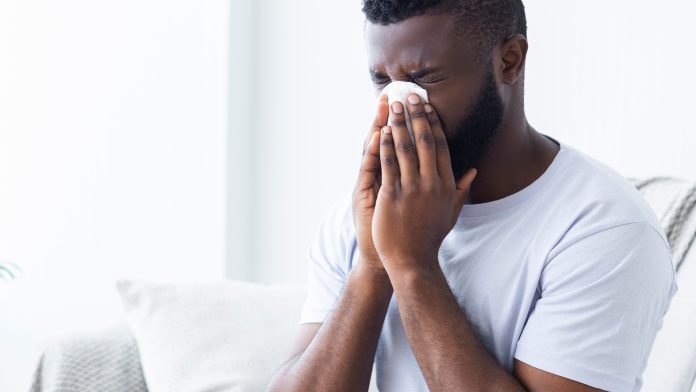
A new study published in the respiratory journal Thorax, found that individuals with allergies such as hay fever, rhinitis, and atopic eczema, may have a lower risk of COVID-19 infection, especially if they also have asthma.
Allergies cause a reaction in the body to a particular food or substance. They are very common, affecting more than 1 in 4 people in the UK at some point in their lives. They’re particularly common in children. Some allergies go away as children get older, although many are lifelong. However, adults can develop allergies to things they were not previously allergic to.
The study also found that contrary to previous research, older age, male sex and other underlying conditions are not linked to a heightened risk of infection.
Asian ethnicity, obesity, household overcrowding, socialising indoors with other households, and holding down a people-facing role other than in health and social care are all independently associated with a heightened risk of developing COVID-19, the findings show.
Studying over 16,000 UK adults
To understand whether allergies and other influential factors impact COVID-19 infection risk, the researchers captured details from a large, population-based study to determine how demographics, socioeconomic, lifestyle, diet, and medical treatment could impact the risk of infection.
16,081 people were eligible with 15,227 completing at least one subsequent monthly follow-up questionnaire 30 days or more after joining the study, and 14,348 completed the final questionnaire on or before 5 February 2021. Participants were asked to provide information on their age, household circumstances, job, lifestyle, weight, height, long-standing medical conditions, medication use, vaccination status, diet, and supplement intake when they joined the study and then again in subsequent months. The study took place between May 2020 and February 2021.
The average age of participants was 59; 70% were women and 95% identified their ethnic origin as white.
The researchers discovered that 446 participants (almost 3%) had at least one episode of confirmed COVID-19 infection, determined by a swap (PCR or lateral flow) during the study period and 32 were admitted to the hospital.
How allergies and other factors impact infection risk
To establish whether allergies and other influential factors impact COVID-19 infection risk, the researchers accounted for a range of potentially significant factors including:
- Age, sex, ethnicity.
- Length of participation in the study, testing frequency.
- Deprivation, household income, housing type, number of people per bedroom, school children at home, ownership of a pet dog.
- Shielding, socialising with other households, visits to shops and other indoor public places, travel to work or study.
- Frontline worker status.
- Physical activity, alcohol intake, weight (BMI).
- Asthma, allergies, use of immune suppressant drugs, inhaled corticosteroids, and bronchodilators, BCG vaccination status.
- Fruit, vegetable, and salad intake; and use of nutritional supplements.
The study found that certain factors were independently associated with increased odds of developing COVID-19.
People of Asian/Asian British ethnicity were more than twice as likely to become infected as their white counterparts. Similarly, household overcrowding; socialising with other houses in the preceding week; number of visits to indoor public places; a people-facing role other than in health and social care; and overweight/obesity were all associated with a heightened risk of infection.
Atopic diseases that are triggered by allergies such as eczema/dermatitis and hay fever/allergic rhinitis, was independently associated with 23% lower odds of developing the infection than it was in those without allergies and asthma. Amongst those who had an atopic disease (allergies) and asthma, the risk was even lower at 38%. This association held true even after factoring in the use of steroid inhalers.
Taking drugs to dampen down the immune system response (immunosuppressants) was also associated with 53% lower odds of COVID-19 infection, although this may reflect greater shielding from infection by these patients, say the researchers.
But age, sex, other medical conditions, diet, and supplement use weren’t associated with infection risk.
Study limitations
As an observational study, the researchers cannot establish a cause. They have acknowledged some limitations to their study.
These include no oversight of swab testing and reliance on the results of routine testing that will usually have been prompted by symptoms, so potentially missing those with symptomless infection.
Participants also volunteered themselves, meaning that some ethnic minorities, particularly people of black, African and Caribbean ethnicities, were underrepresented in the study.
Nevertheless, the researchers conclude: “This large, population-based prospective study shows that there is limited overlap between risk factors for developing COVID-19 versus those for intensive care unit admission and death, as reported in hospitalised cohorts.”
























